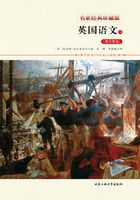
第12章 THE FRIGATE-BIRD 海鸟
What bird is this? It is the little ocean-eagle, first and chief of the winged race, the daring navigator who never furls his sails, the lord of the tempest, the scorner of all peril—the man-of-war or frigate-bird.
Here we have a bird which is virtually nothing more than wings: scarcely any body—barely as large as that of the domestic cock—while his prodigious pinions are fifteen feet in span! The great problem of flight is solved and overpassed, for the power of flight seems useless. Such a bird, naturally sustained by such supports, needs but allow himself to be borne along. The storm bursts; he mounts to lofty heights, where he finds tranquility. The poetic metaphor, untrue when applied to any other bird, is no exaggeration when applied to him: literally, he sleeps upon the storm.
When he chooses to oar his way seriously, all distance vanishes: he breakfasts at the Senegal; he dines in America.
Or if he thinks fit to take more time, and amuse himself on route, he can do so. He may continue his progress through the night uninterruptedly, certain of reposing himself. Upon what? On his huge motionless pinion, which takes upon itself all the weariness of the voyage; or on the wind, his slave, which eagerly hastens to cradle him
Amid the glowing azure of the tropics, at incredible altitudes, almost imperceptible in the dim remoteness, we see him triumphantly sweeping past us—this black, solitary bird, alone in the waste of heaven; or, at the most, at a lower elevation, the snow-white sea-swallow crosses his flight in easy grace!
On looking at him closely, you perceive that he has no feet. At all events, his feet, being exceedingly short, can neither walk nor perch. With a formidable beak, he has not the talons of a true eagle of the sea.
Thence arises his life of uncertainty and hazard—the life of a corsairs and a pirate rather than of a mariner.
The immense and superb apparatus of his wings becomes on land a danger and an embarrassment. To raise himself, he needs a strong wind and a lofty station—a promontory, a rock. Surprised on a sandy level, on the banks, the low reefs where he sometimes halts, the frigate-bird is defenseless;in vain he threatens, in vain he strikes, for a blow from a stick will overcome him.
At sea, those vast wings, of such admirable utility in ascent, are ill fitted for skimming the surface of the water. When wetted, they may over-weight and sink him. And thereupon, woe to the bird!
And yet, what shall he do? His food lies in the waters. He is ever compelled to draw near them, to return to them to skim incessantly the hateful and prolific sea which threatens to engulf him.
Thus, then, this being, so well armed and winged, superior to all others in power of flight and vision as in daring, leads but a trembling and precarious life. He would die of hunger had he not the ingenuity to create for himself a purveyor, whom he cheats of his food. His ignoble resource, alas! is to attack a dull and timorous bird, the noddy, famous as a fisher. The frigate-bird, which is of no larger dimensions, pursues him, strikes him on the neck with his beak, and constrains him to yield up his prey. All this takes place in the air. The noddy drops the fish: but the frigate-bird catches it before ft can reach the water.
—JULES MICHELET.
Words
altitudes,heights.
apparatus,machinery.
constrains,compel.
dimensions,site.
embarrassment,hindrance.
formidable,dreadful.
ignoble,mean.
imperceptible,invisible.
metaphor,image.
precarious,uncertain.
prodigious,vast.
prolific,fruitful.
resource,expedient.
solitary,lonely.
sustained,supported.
tempest,storm.
timorous,cowardly.
uninterruptedly,continuously.
utility,usefulness.
Questions
Why does the frigate-bird fly so easily? Where does he go to escape the storm? On what does he repose himself in the night? Why is he helpless on land? Why is it dangerous for him to skim the surface of the water? On what does he feed? How does he procure it?
这是什么鸟?它是海上的小鹰,是飞禽中的佼佼者,是勇敢的引航者,它从不半途而废,它是暴风雨的君主,它蔑视一切危险;它是战士,是海鸟。
我们看到的这鸟儿除了翅膀之外几乎别无其他:几乎没有身体——身体只相当于家鸡那么大——然而它那巨大的翅膀展开来居然有十五英尺之长!如此,飞翔的问题就解决了,因为飞翔的力量似乎是不费吹灰之力的。这样的鸟,生来就有这样的先天优势,需要自己成为独行侠,也只能允许自己这样。暴风雨来到了,它扶摇直上到高处,那里安静平和。诗人那些对别的鸟的不实的比喻,放在它身上却丝毫不夸张。顾名思义,它睡在暴风雨之上。
当它选择奋力飞翔的时候,所有的距离都消失了。它在塞内加尔吃早餐,在美洲进食晚餐。
或者,如果它想再多花一点儿时间,想在路上自娱自乐的话,它也能做得到。它可以继续自己的旅程,整夜飞翔不间断。如果它要歇息一番,靠什么呢?靠它那巨大的不动的羽翼,它们能轻而易举地飞完那疲劳的旅行;或者靠它的努力,风力,因为风力会迫不及待地变成它的摇篮,将它抚慰。
在热带地区蔚蓝的海面上,在高海拔地带,向远处几乎望不到什么,我们却能看到海鸟胜利昂扬地在我们身边掠过。这黑色孤独的鸟儿,独自在广袤的天空中飞着;或者,在大部分的时候,在海拔低一些的地方,它优雅而不费力地飞过白雪一样的海面。
近处观察它的话,你会看见它并没有脚爪。在任何情况下,它那极其短小的脚爪,既不能走路又不能栖息。有了它那骇人的大喙,它就不需要像海鹰那样的利爪了。
之后它的生活就变得不可预测而充满危险了,那是海盗的生活,而不是航海者的生活。
它那巨大而卓越的翅膀,到了陆地上就成了威胁它生命并引起不便的装备。为了能飞起来,它需要强劲的风和一个高地——海角,礁石。让人惊讶的是,它经常停留在平坦的沙地上,或者停在河岸边,或是那些低陷的暗礁上,于是这海鸟就变得毫无防备能力;它徒劳地发出威胁,徒劳地反抗,因为一根棍子的击打就能结束它的生命。
在海上,这巨大的翅膀,在飞翔时如鱼得水,但在水面滑翔的时候则失去优势。当它的翅膀蘸湿的时候,它们会因为过重而让海鸟沉溺。因此,这鸟儿真可怜啊!
然而,它能怎么办呢?它的食物都在水里。它总是不得不靠近水面去捕食,不断地掠过水面,掠过那让它憎恨的多产的海面,而那大海则威胁着要吞掉它。
因此,这生物的装备如此良好,羽翼如此丰满,比其他飞禽都有优势,视野比它们都要开阔,实际上却生活得战战兢兢,如履薄冰。如果它不是聪明地给自己找了个供食者,肯定早就饿死了。从供食者那里,它夺取食物。它那不光彩的食物来源,就是靠攻击木讷而胆小的鸟类,也就是以捕鱼而著名的燕鸥。海鸟的身形实际上并不比燕鸥大,它追逐燕鸥,啄打燕鸥的颈部,迫使燕鸥放弃自己的猎物,这一切都发生在空中。燕鸥捕到的鱼掉下来,但海鸟却能在鱼掉在水里之前把鱼截住。
——朱尔斯·米奇乐